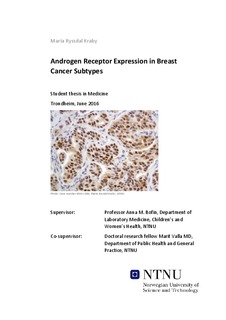Androgen receptor expression in breast cancer subtypes
Master thesis

Åpne
Permanent lenke
http://hdl.handle.net/11250/2418344Utgivelsesdato
2016Metadata
Vis full innførselSamlinger
Sammendrag
Background The androgen receptor (AR) is frequently expressed in breast cancer, and associated with good prognosis in ER-positive breast cancers. Due to its high prevalence, AR is also a possible target for therapeutic management in breast cancer. More studies are needed to assess AR expression across molecular subtypes of breast cancer. Aims The present study aimed to investigate associations between AR expression and breast cancer survival in two well-described cohorts of Norwegian breast cancer patients, and to study AR expression in relation to molecular subtypes and clinicopathological features of breast cancer. Methods Immunohistochemistry for AR was carried out on 1340 breast cancers previously reclassified into molecular subtypes. Chi-square tests were used to investigate associations between AR expression and clinicopathological features, while cumulative incidence of breast cancer death and Cox regression analyses were used for survival analyses. Results A total of 78.0 % of cases were AR-positive at 10 % cut-off. 45.1 % of oestrogen receptor (ER) negative and 84.9 % of ER-positive tumours were AR positive. AR expression was associated with age, tumour size, stage, histological type, histopathological grade, ER, progesterone receptor, basal biomarkers and molecular subtype. The highest proportion of AR positivity was found in Luminal B tumours, and the lowest in Basal Phenotype tumours. At 10 % cut-off, AR was an independent prognostic marker in breast cancer (HR 0.69 (95 % CI 0.54-0.88)). Stratified for ER status, the prognostic value of AR was limited to ER-positive tumours (HR 0.67 (95 % CI 0.49-0. 91) versus 0.65 (95 % CI 0.41-1.03) in ER-negative tumours). Within the molecular subtypes, AR only showed prognostic value in the HER2-negative Luminal subtypes. Considering grade, AR expression was associated with improved survival in Grade 2 and Grade 3. Conclusions In the present study, AR expression in more than 10 % of tumour cells was an independent prognostic factor in breast cancer. Assessment of AR expression in breast cancer could provide additional prognostic information in ER-positive breast cancers. AR is the only steroid receptor expressed in a proportion of triple-negative breast cancers, and its value as a therapeutic target in these tumours should be further studied.